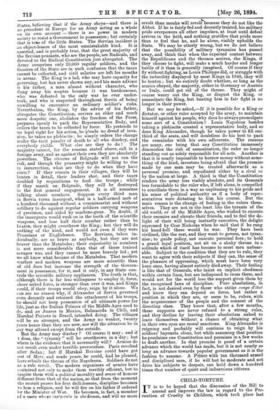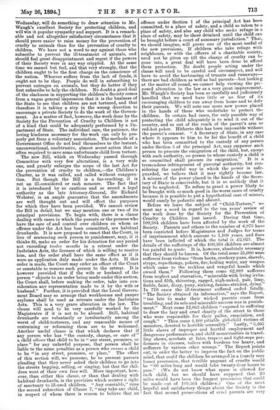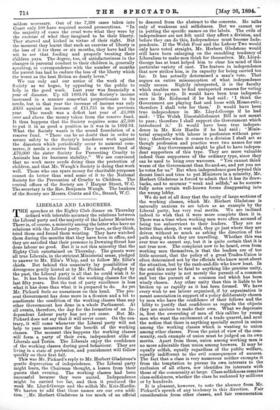CHILD-TORTURE.
IT is to be hoped that the discussion of the Bill to amend and. improve the law in regard to the Pre- vention of Cruelty to Children, which took place last Wednesday, will do something to draw attention to Mr. Waugh's excellent Society for protecting children, and will win it popular sympathy and support. It is a remark- able and not altogether satisfactory circumstance that it should prove easier to raise money for the prevention of cruelty to animals than for the prevention of cruelty to children. We have not a word to say against those who subscribe to prevent the ill-treatment of animals, and should feel great disappointment and regret if the powers of their Society were in any way crippled. At the same time we cannot but feel, and that very strongly, that the children ought to be the first charge on the conscience of the nation. Whoever suffers from the lack of funds, it ought not to be they. People do well in subscribing to prevent outrages on animals, but they do better if they first subscribe to help the children. No doubt a good deal of the slackness in supporting the children's Society comes from a vague general impression that it is the business of the State to see that children are not tortured, and that therefore it is taking a step in the wrong direction to encourage a private Society to do the work of the Govern- ment. As a matter of fact, however, the work done by the Society for the Prevention of Cruelty to Children is not of a kind that could be adequately performed by a De- partment of State. The individual care, the patience, the loving kindness necessary for the work can only be pro- perly got from a voluntary association. The methods of a Government Office do not lend themselves to the instant, unconventional, unobtrusive, almost secret action that is often required to save some unfortunate child from torture.
The new Bill, which on Wednesday passed through Committee with very few alterations, is a very wide one, and greatly enlarges the scope of the last Act for the prevention of cruelty to children,—the Children's Charter, as it was called, and called without exaggera- tion. But though the Bill is a far-reaching, it is not an ill-considered or rash measure. The fact that it is introduced by so cautious and so sound a legal authority as the late Attorney-General, Sir Richard Webster, is an ample guarantee that the amendments are well thought out and will effect the purposes for which they have been provided. We cannot review the Bill in detail, but we may mention one or two of its principal provisions. To begin with, there is a clause dealing with cases in which the parents or the persons who have the care of and control over children on whom an offence under the Act has been committed, are habitual drunkards. It is now proposed to enact that the Court, in lieu of sentencing such person to punishment, may, if it thinks fit, make an order for his detention for any period not exceeding twelve months in a retreat under the Inebriates Acts, the licensee of which is willing to receive him, and the order shall have the same effect as if it were an application duly made under the Acts. If this order is made, the Court may order an officer of the Court or constable to remove such person to the retreat. It is however provided that if the wife or husband of the person "objects to an order being made under this section, the Court shall, before making the order, take into con- sideration any representation made to it by the wife or husband." Further, it is provided that the Local Govern- ment Board may so arrange that workhouses and pauper asylums shall be used as retreats under the Inebriates Acts. This is a very grave alteration in the law. The clause will need to be very carefully worked by the Magistrates if it is not to be abused. Still, habitual drunkards are voluntarily or involuntarily among the worst of child-torturers, and any reasonable means of restraining or reforming them are to be welcomed. Another useful clause is that which declares that if any person who has "the custody, charge, or care of" a child allows that child to be in "any street, premises, or place" for any unlawful purpose, that person shall be liable to the same penalties as a person who causes a child to be "in any street, premises, or place." The effect of this section will, we presume, be to prevent parents pleading that they never asked their children to go into the streets begging, selling, or singing, but that the chil- dren went of their own free will. More important, how- ever, than either this clause, or than that dealing with habitual drunkards, is the provision which secures a right of sanctuary to ill-used children. "Any constable," runs the second subsection of Clause 7, "may take any child, in respect of whom there is reason to believe that an offence under Section 1 of the principal Act has been committed, to a place of safety, and a child so taken to a, place of safety, and also any child who seeks refuge in a place of safety, may be there detained until the child can be brought before a court of summary jurisdiction." That, we should imagine, will prove one of the most useful of the new provisions. If children who take refuge with neighbours, or with the officers of a charitable society, need not be given up till the charge of cruelty can be gone into, a great deal will have been done to afford them protection. No doubt people acting under the clause will need to be careful and circumspect, and will have to avoid the harbouring of truants and runaways— there are bad children as well as bad parents—but looking at the matter all round, we cannot help viewing the pro- posed alteration in the law as a very great improvement. Mr. Waugh's Society has been so carefully and judiciously handled that we need have little or no fear of its encouraging children to run away from home and to defy their parents. We will note one more new power placed in the hands of those who undertake to protect the children. In certain bad cases, the only possible way of protecting the child adequately is to send it out of the country, and so out of the reach of the parent's arm or red-hot poker. Hitherto this has been impossible without the parent's consent. "A Secretary of State, in any case where it appears to him to be for the benefit of a child who has been committed to the custody of any person under Section 5 of the principal Act, may empower such person to procure the emigration of the child, but, except. with such authority, no person to whose custody a child is so committed shall procure its emigration." It is a tremendous infringement of parental authority, but con- sidering the careful way in which the power is safe- guarded, we believe that it may rightly become law. A misuse of the power placed in the hands of the Secre- tary of State is conceivable, but it is so unlikely that it may be neglected. To refuse to grant a power likely to be fraught with so much good in the worst cases of cruelty because it is possible to put a hypothetical case of misuse, would surely be pedantic and absurd. Before we leave the subject of "Child-Torture," we must say a word in regard to the ten years' review of the work done by the Society for the Prevention of Cruelty to Children just issued. During that time, 109,364 children have been affected by the work of the Society. Parents and others to the number of 6,973 have been convicted before Magistrates and Judges for terms of imprisonment which amount to 1,108 years, and fines have been inflicted of which the total is £2,023. The details of the sufferings of the 109,364 children are almost too painful to quote. It is, however, absolutely necessary that they should be known. Of the total some 25,000 were sufferers from violence "from boots, crockery-pans, shovels, straps, rope-thongs, pokers, fire, boiling water, any weapon which came to the reckless and vengeful hands which owned them." Following these come 62,889 sufferers from neglect and starvation, "miserable with living irrita- tions and filth, shivering, ragged, nigh-naked, pale, limp. feeble, faint, dizzy, puny, sinking, famine-stricken, dying." In 710 cases the ill-treatment suffered ended fatally. "The Society obtained its information," says the Report, "too late to make their wicked parents cease from troubling, and its sole and miserable success was in punish- ment." Next come 12,663 children "exposed to suffering to draw the lazy and cruel charity of the street to those who were responsible for their pallor, emaciation, and cough." "Then come 4,460 pitiable girl-child victims of monsters, devoted to horrible sensuality." Lastly, "3,20 little slaves of improper and hurtful employment and dangerous performances, and child monstrosities in travel- ling shows, acrobats at fairs, trapeze and tight-rope per- formers in circuses, toilers with burdens too heavy, and sufferers by various other wrongs." The Report points out, in order the better to impress the fact on the public mind, that could the children be arranged in a (surely very loose) procession, that terrible pageant of cruelty would be "60 miles long and would take twenty-four hours to pass." (We do not know what space is allowed for each child, but we should have supposed that 20 miles would have been the longest procession that could be made out of 109,364 children.) One of the most hopeful and satisfactory things about the Society is the fact that second prosecutions of cruel parents are very seldom necessary. Out of the 7,398 cases taken into Court only 100 have required second prosecutions. "In the majority of cases the cruel were what they were by the exercise of what they imagined to be their liberty. They starved and kicked in virtue of their right. Bat the moment they learnt that such an exercise of liberty is the loss of it for three or six months, they have had the wit to see that feeding and properly treating their children pays. The degree, too, of satisfactoriness in the changes in parental conduct to their children is, generally speaking, in correspondence with the number of months the parent has had to endure the loss of the liberty which the worst as the best Briton so dearly loves."
We can only end our notice of the work of the Smiety as we began, by appealing to the public to help in the good work. Last year was financially a year of disaster. Up till 1893-94 the Society's income increased in a manner somewhat proportionate to its needs, but in that year the increase of income was only £453 against an increase of 111,755 in the previous year. The result was a deficit last year of £5,988 over and above the money taken from the reserve fund. It thus happens that the Society requires some £7,300 to put it in as good a position as it was in in 1892-93. What the Society wants is the sound foundation of a reserve fund. "There can be no doubt that in order to secure safety to the Society's beneficent work against the disasters which periodically occur to national com- merce, it needs a reserve fund. In a reserve fund of £70,000 the sister Society for Preventing Cruelty to Animals has its business stability." We are convinced that no work more needs doing than the protection of children, and that Mr. Waugh's Society is doing that work well. Those who can spare money for charitable purposes cannot do better than send some of it to the National Society for the Prevention of Cruelty to Children. The central offices of the Society are 7 Harpur Street, W.C. The secretary is the Rev. Benjamin Waugh. The bankers of the Society are Messrs. Coutts and Co., Strand, W.C.




































 Previous page
Previous page